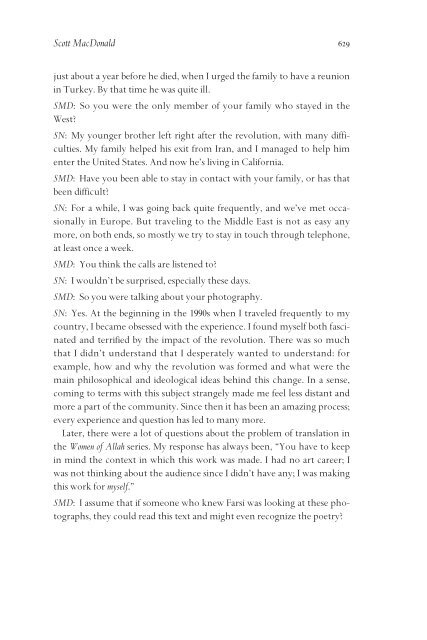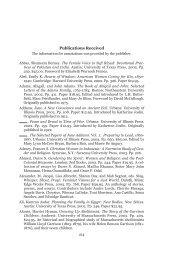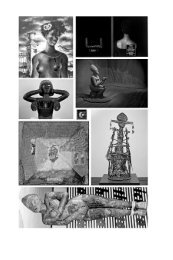An Interview with Shirin Neshat - Feminist Studies
An Interview with Shirin Neshat - Feminist Studies
An Interview with Shirin Neshat - Feminist Studies
Create successful ePaper yourself
Turn your PDF publications into a flip-book with our unique Google optimized e-Paper software.
Scott MacDonald 629<br />
just about a year before he died, when I urged the family to have a reunion<br />
in Turkey. By that time he was quite ill.<br />
SMD: So you were the only member of your family who stayed in the<br />
West?<br />
SN: My younger brother left right after the revolution, <strong>with</strong> many difficulties.<br />
My family helped his exit from Iran, and I managed to help him<br />
enter the United States. <strong>An</strong>d now he’s living in California.<br />
SMD: Have you been able to stay in contact <strong>with</strong> your family, or has that<br />
been difficult?<br />
SN: For a while, I was going back quite frequently, and we’ve met occasionally<br />
in Europe. But traveling to the Middle East is not as easy any<br />
more, on both ends, so mostly we try to stay in touch through telephone,<br />
at least once a week.<br />
SMD: You think the calls are listened to?<br />
SN: I wouldn’t be surprised, especially these days.<br />
SMD: So you were talking about your photography.<br />
SN: Yes. At the beginning in the 1990s when I traveled frequently to my<br />
country, I became obsessed <strong>with</strong> the experience. I found myself both fascinated<br />
and terrified by the impact of the revolution. There was so much<br />
that I didn’t understand that I desperately wanted to understand: for<br />
example, how and why the revolution was formed and what were the<br />
main philosophical and ideological ideas behind this change. In a sense,<br />
coming to terms <strong>with</strong> this subject strangely made me feel less distant and<br />
more a part of the community. Since then it has been an amazing process;<br />
every experience and question has led to many more.<br />
Later, there were a lot of questions about the problem of translation in<br />
the Women of Allah series. My response has always been, “You have to keep<br />
in mind the context in which this work was made. I had no art career; I<br />
was not thinking about the audience since I didn’t have any; I was making<br />
this work for myself.”<br />
SMD: I assume that if someone who knew Farsi was looking at these photographs,<br />
they could read this text and might even recognize the poetry?




